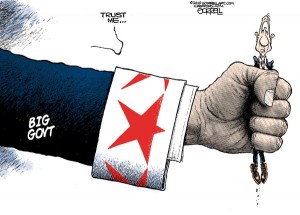The government should incentivize healthy choices rather than prohibit unhealthy ones.
by Peter Roff • US News
 America has tried the experiment with prohibition before. It didn’t work.
America has tried the experiment with prohibition before. It didn’t work.
That lesson seems to be lost on New York City Mayor Michael Bloomberg, who is spending an inordinate amount of time trying to protect people from things that are supposedly not good for them. First it was cigarettes. Then it was trans-fat. Now it’s large sodas. Where will it end?
Actually, that’s an important question. We live in a country where Congress and the president can collude to produce a law forcing everyone to purchase health insurance or pay fines and penalties. Does that mean, as more than one person has asked, they can likewise enact laws intended to force people to eat broccoli?
It’s true that the founders intended state and local governments to have a greater degree of latitude concerning the laws they passed. Still and all, these laws attacking freedom of choice in what we eat and drink seem to be over and above anything they might ever have intended. Moreover, the approach seems wrong-headed.
Instead of banning foods or raising taxes on the foods some bureaucrat and some scientist can convince an elected official are bad for people, why not incentivize the system to make healthier foods cheaper? Instead of raising taxes on soda pop, as seems to be the new trend, why not cut taxes on fruit juices and bottled water? Make it actually cheaper for people to make the so-called “good” choice rather than just comparatively cheaper.
All told, the food police seem more intent on growing the power and authority of the state than anything else. Bigger, more intrusive government depriving us of the right to make choices—even choices that are bad for us—is the order of the day, in a sort of Orwellian fashion. Those who argue that we all shoulder the costs of the these “bad” choices forget that it was the same kind of government do-goodism that made us all responsible, in an economic sense, in the first place. The fault, dear Brutus, lies not in the stars but in ourselves.
. . . . . . . . . . . . . . . .
Peter Roff is a contributing editor at U.S. News & World Report. Formerly a senior political writer for United Press International, he’s now affiliated with several public policy organizations including Let Freedom Ring, and Frontiers of Freedom. His writing has appeared in National Review, Fox News’ opinion section, The Daily Caller, Politico and elsewhere. Follow him on Twitter @PeterRoff.